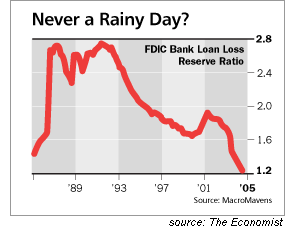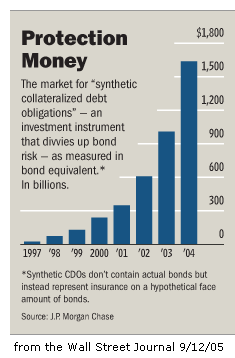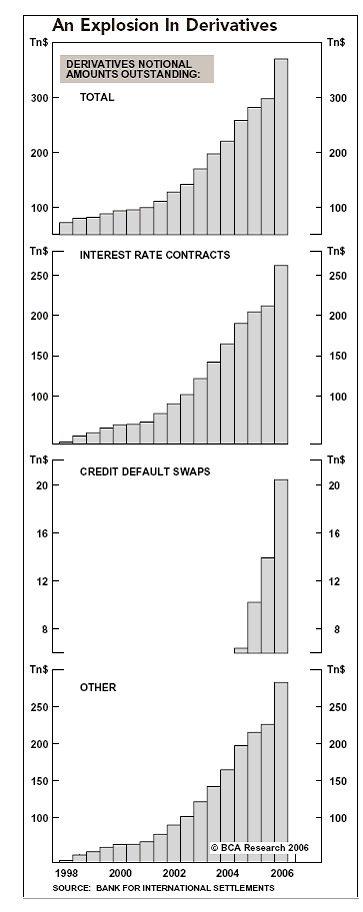Why We're in this Handbasket--and It's Getting Hotter (Part 2) Perverse Incentives
As our handbasket hurtles ever faster down a tunnel toward a glowing red opening surrounded by grinning red creatures with pitchforks in hand, it's a good moment to consider the set of incentives --mostly perverse, but all politically selected--which contributed to our destruction.
All the happy paens to Capitalism neglect to mention its most fundamental characteristic: laziness is the highest virtue. Wait a minute, that's not what we were taught in school!
Uh, I know. But think about it. if you can maximize your profit without actually producing value, then there's a huge incentive to do so. If you can make a stupendous profit by signing a few papers, as opposed to sweating and toiling and risking a bunch of capital, then you'll gladly choose the lazy way to wealth.
If you can grind up free rats (or melamine) into your sausage rather than have to pay good money for pork or beef, then the incentive--maximum profit--says "go for it." This is how business operated at the turn of the century in the (unregulated) U.S. and how it operates in (mostly unregulated) China today.
If you can drive your competitors out of business, by whatever means are necessary, then you will be maximizing profits the lazy way, by charging more for the same product. Hey, it worked for Rockefeller in the oil business, and many others since.
If you can "option" three houses which aren't even built yet for a few thousand dollars, and then flip those options-to-buy for $20,000 profit each, then the incentive is to do so. Why risk capital or bother actually building the darn thing yourself? Just take the laziest profit possible--that's the systemic incentive.
Now we come to the sleaziest--oops, I meant easiest--and laziest--way to generate vast profits: take some debt, chop it up, add a couple hundred pages of boilerplate, and then sell the new pieces of paper for billions in pure profit. Talk about lazy: nothing of value has been produced, and no service rendered except to yourself.
Wait, you protest: you're combining speculation with monopoly and unfair trade practices and with cheating the customer--you can't do that. I repeat: the fundamental characteristic of Capitalism is laziness. If you don't have to risk your own capital, then you don't-- you risk someone elses. If you don't have to risk any capital at all, then you don't. If you can double the price of your good or service overnight, then you will, and you're not worried about efficiency or fair trade or any of that crap: to get rich is glorious, especially if it's easy.
You see where this is going, right? This is why we have regulations: about making sausage, about mortgages, and about financial instruments.
We have been in a cultural and psychological climate since 1981 in which government regulation has been decried, even derided, as stifling, bureaucratic, etc. And indeed it can be. In fact, over-regulation and outrageous regulatory fees are perverse incentives themselves.
If obtaining a sewer connection permit in the city costs $20,000 per unit, then what's the incentive? It's to go out to the boondocks and build the houses in a county where the permits for everything cost $1,000, not $40,000 or more.
Then there's the issue of having regulations which are rendered toothless by gutting the investigative staff or refusing to enforce the regulations. For instance, someone bought 200,000 puts on Bear Stearns stock (controlling 20 million shares) just days before it dropped from $30 to under $5. That someone (or group) made stupendous profits by trading what was obviously insider information that BSC was about to go bankrupt or be acquired for much less than $30/share.
Will anyone be brought to justice for this insider trading? Not in today's climate. Sure, the rules are on the books, but if they're ignored or enforced sporadically, then what value do they have?
Regulations are a key part of what is known as "good governance." It's what kleptocracies, dictatorships and "basketcase" countries lack.
Regulatory systems are not random events. They are political assemblies of choices made by leaders of our government. Now we come to the issue of what has been regulated and what has not, and what has been so laxly regulated that is has in effect operated in near-complete laissez faire fashion.
Want to buy and trade stock options? They're regulated.
Want to buy and trade commodities futures? They're regulated.
Want to start a depositor banK? They're regulated.
Want to create a complex derivative combining currency, interest rates and asset-backed securities? You're home free, baby--there's no regulations to limit how many sheep you can round up and slaughter.
If you think such a derivative is farfetched, please read Fiasco: The Inside Story of a Wall Street Trader (recommended by longtime correspondent Cheryl A.)
For more on what is not regulated, we turn to frequent contributor Harun I. for an explanation:
"What most people don't seem to understand that most of what happened has involved securities not regulated by the SEC or the CFTC. The argument that these mysterious instruments were indeed futures contracts and therefore should be regulated by the CFTC was finally defeated (more by brute force than by logic) -- and the feeding frenzy began.
Furthermore if you deal with exclusively "sophisticated" investors (QEPs) and (in the futures markets) claim a 4.7 exemption, then you are released from disclosure and the requirement to provide investors with an annual certified audit. More simply, once a 4.7 exemption is granted the risks don't have to be disclosed. (emphasis added, CHS) The catch is that disclosure document must be made available at the investors request. Therefore due diligence is entirely up to the investor.
ecfr.gpoaccess.gov
The above is lengthy but very informative. While it deals with CPO's, hedge funds in the equity markets are similar.
for those who don't wish to read the link in its entirety, although I highly recommend it, here are the paragraphs that cut to the chase:
"(1) Disclosure relief. (i) Exemption from the specific requirements of §§4.21, 4.24, 4.25 and 4.26 with respect to each exempt pool; Provided, That if an offering memorandum is distributed in connection with soliciting prospective participants in the exempt pool, such offering memorandum must include all disclosures necessary to make the information contained therein, in the context in which it is furnished, not misleading; and that the following statement is prominently disclosed on the cover page of the offering memorandum, or, if none is provided, immediately above the signature line on the subscription agreement or other document that the prospective participant must execute to become a participant in the pool:
“PURSUANT TO AN EXEMPTION FROM THE COMMODITY FUTURES TRADING COMMISSION IN CONNECTION WITH POOLS WHOSE PARTICIPANTS ARE LIMITED TO QUALIFIED ELIGIBLE PERSONS, AN OFFERING MEMORANDUM FOR THIS POOL IS NOT REQUIRED TO BE, AND HAS NOT BEEN, FILED WITH THE COMMISSION. THE COMMODITY FUTURES TRADING COMMISSION DOES NOT PASS UPON THE MERITS OF PARTICIPATING IN A POOL OR UPON THE ADEQUACY OR ACCURACY OF AN OFFERING MEMORANDUM. CONSEQUENTLY, THE COMMODITY FUTURES TRADING COMMISSION HAS NOT REVIEWED OR APPROVED THIS OFFERING OR ANY OFFERING MEMORANDUM FOR THIS POOL.”
(3) Annual report relief . (i) Exemption from the specific requirements of §§4.22(c) and (d); Provided, That within 90 calendar days after the end of the exempt pool's fiscal year, the commodity pool operator electronically files with the National Futures Association and distributes to each participant in lieu of the financial information and statements specified by those sections, an annual report for the exempt pool, affirmed in accordance with §4.22(h) which contains, at a minimum:
(A) A Statement of Financial Condition as of the close of the exempt pool's fiscal year (elected in accordance with §4.22(g));
(B) A Statement of Income (Loss) for that year; and
(C) Appropriate footnote disclosure and any other material information.
(ii) Such annual report must be presented and computed in accordance with generally accepted accounting principles consistently applied and, if certified by an independent public accountant, so certified in accordance with §1.16 as applicable.
(iii) Legend. (A) If a claim for exemption has been made pursuant to this section, the commodity pool operator must make a statement to that effect on the cover page of each annual report.
(B) If the annual report is not certified in accordance with §1.16, the pool operator must make a statement to that effect on the cover page of each annual report and state that a certified audit will be provided upon the request of the holders of a majority of the units of participation in the pool who are unaffiliated with the commodity pool operator.
Being somewhat dim and overwhelmed with the above, I then asked Harun specifically: does this mean derivatives are unregulated? Here is his reply:
cftc,gov
The Commodity Futures Modernization Act, as adopted, is a significant step forward for U.S. financial markets. This important new law creates a flexible structure for regulation of futures trading, codifies an agreement between the Commodity Futures Trading Commission (CFTC) and the Securities and Exchange Commission to repeal the 18-year old ban on trading single stock futures and provides legal certainty for the over-the-counter derivatives markets.
Yes. Since as far back as 1982 there had been an argument as to whether OTC derivatives were in fact futures contracts and therefore, in order to be legal, should be regulated by the CFTC. In the meantime these derivatives, whose very legality was in question, were created anyway and grew to such and extent that through brute force alone (with the help of the PPT) rather than logic was it decided that these derivative were legal and exempt as long as they are entered into be eligible contract participants.
CDOs are indeed securities but as long as the purchasers meet certain requirements there is relief from disclosure and reporting."
Thank you, Harun, for explaining a complex topic.
Let's go back to kleptocracies, dictatorships and "basketcase" countries run by oligarchies. These nations often have sham regulations which are constructed to offer the appearance of good governance without actually providing good governance.
In international negotiations such as the World Trade Organization, the U.S. stands on the high moral ground and wags its finger in stern admonishment of nations who come hat in hand to join the ranks of those paragons of good governance such as the U.S.
When you let a bank hold a miniscule 1% of its loan book as reserves against loss, how can that be considered good goverance or prudent regulation? And when investment banks are allowed to sell trillions in derivatives specifically constructed to mask risk and maximise profits to the banks, is that good goverance or prudent regulation?
Exactly what is the difference between a hopelessly corrupt regime with sham (unenforced) regulations on its books and the U.S.?
Here is the difference: if you're going to actually produce a good or service, then you will be burdened with an immense load of regulations, and of course fat regulatory fees and heavy taxes at every step.
But if you're adding no value whatsoever, creating no good or service, printing up and trading paper, then you have virtually no regulations. And if you hire the same outfits Enron did, then you can hide much of your profit overseas--just like those tin-hat dictators and kleptocracies do.
These perverse incentives have put us in the handbasket and aimed us straight down the tunnel to a very hot Heck. (Hey, this is a family blog.) It will take a severe societal adjustment (otherwise known as a revolution) to transform the U.S. from a well-cloaked oligarchy/kleptocracy serving an elite to a nation of good governance.
NOTE: contributions are humbly acknowledged in the order received. Your name and email remain confidential and will not be given to any other individual, company or agency.
Thank you, G.F.B., for your generous gift to this humble site, and for your encouragement. I am greatly honored by your contribution and readership. All contributors are listed below in acknowledgement of my gratitude.
Wednesday, March 26, 2008
Terms of Service
All content on this blog is provided by Trewe LLC for informational purposes only. The owner of this blog makes no representations as to the accuracy or completeness of any information on this site or found by following any link on this site. The owner will not be liable for any errors or omissions in this information nor for the availability of this information. The owner will not be liable for any losses, injuries, or damages from the display or use of this information. These terms and conditions of use are subject to change at anytime and without notice.
Our Privacy Policy:
Correspondents' email is strictly confidential. This site does not collect digital data from visitors or distribute cookies. Advertisements served by a third-party advertising network (Investing Channel) may use cookies or collect information from visitors for the purpose of Interest-Based Advertising; if you wish to opt out of Interest-Based Advertising, please go to Opt out of interest-based advertising (The Network Advertising Initiative). If you have other privacy concerns relating to advertisements, please contact advertisers directly. Websites and blog links on the site's blog roll are posted at my discretion.
PRIVACY NOTICE FOR EEA INDIVIDUALS
This section covers disclosures on the General Data Protection Regulation (GDPR) for users residing within EEA only. GDPR replaces the existing Directive 95/46/ec, and aims at harmonizing data protection laws in the EU that are fit for purpose in the digital age. The primary objective of the GDPR is to give citizens back control of their personal data. Please follow the link below to access InvestingChannel’s General Data Protection Notice. https://stg.media.investingchannel.com/gdpr-notice/
Notice of Compliance with
The California Consumer Protection Act
This site does not collect digital data from visitors or distribute cookies.
Advertisements served by a third-party advertising network
(Investing Channel) may use cookies or collect information from visitors for the
purpose of Interest-Based Advertising. If you do not want any personal information
that may be collected by third-party advertising to be sold, please
follow the instructions on this page:
Limit the Use of My Sensitive Personal Information.
Regarding Cookies:
This site does not collect digital data from visitors or distribute cookies. Advertisements served by third-party advertising networks such as Investing Channel may use cookies or collect information from visitors for the purpose of Interest-Based Advertising; if you wish to opt out of Interest-Based Advertising, please go to Opt out of interest-based advertising (The Network Advertising Initiative) If you have other privacy concerns relating to advertisements, please contact advertisers directly.
Our Commission Policy:
As an Amazon Associate I earn from qualifying purchases. I also earn a commission on purchases of precious metals via BullionVault. I receive no fees or compensation for any other non-advertising links or content posted on my site.



























